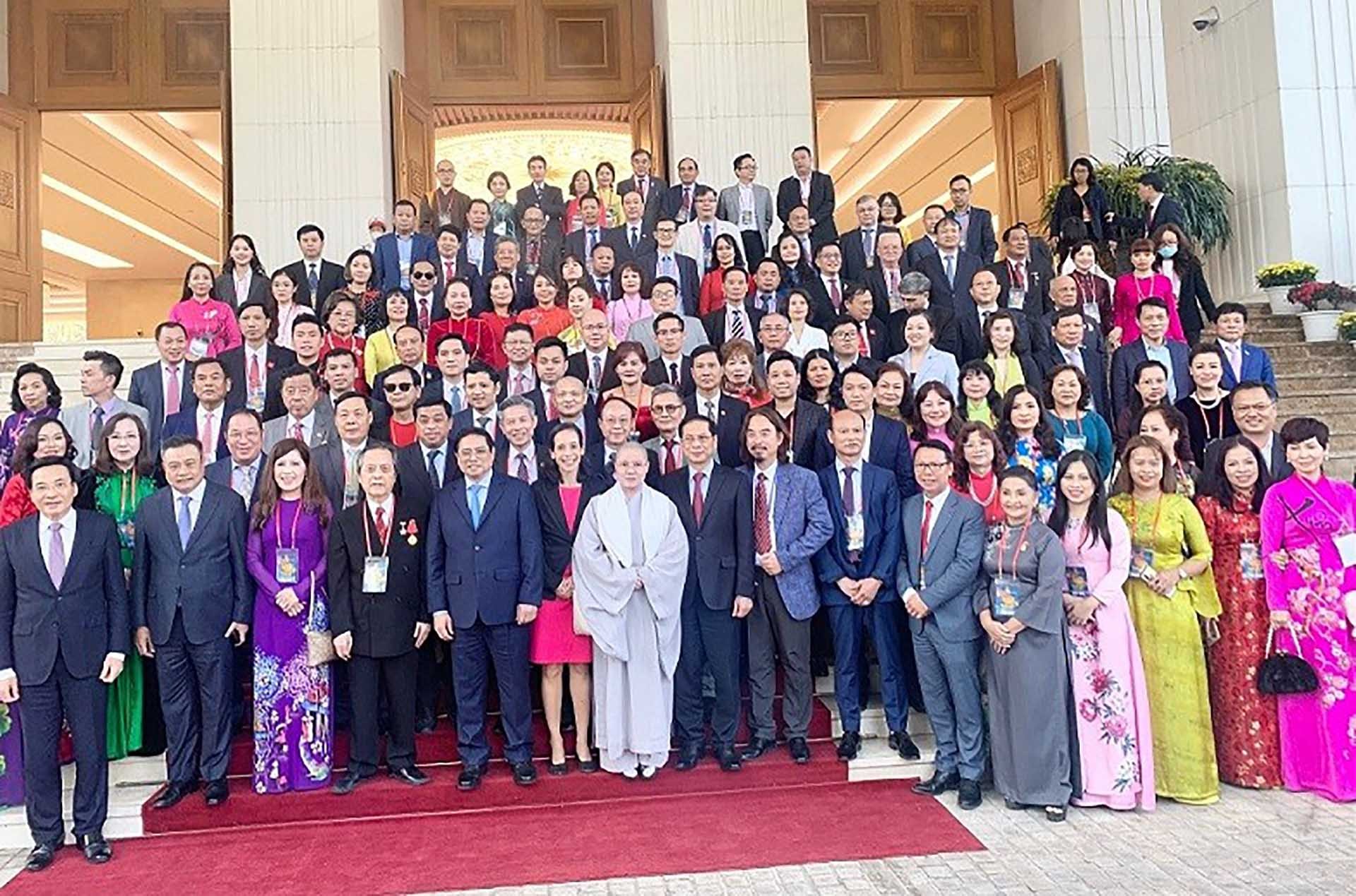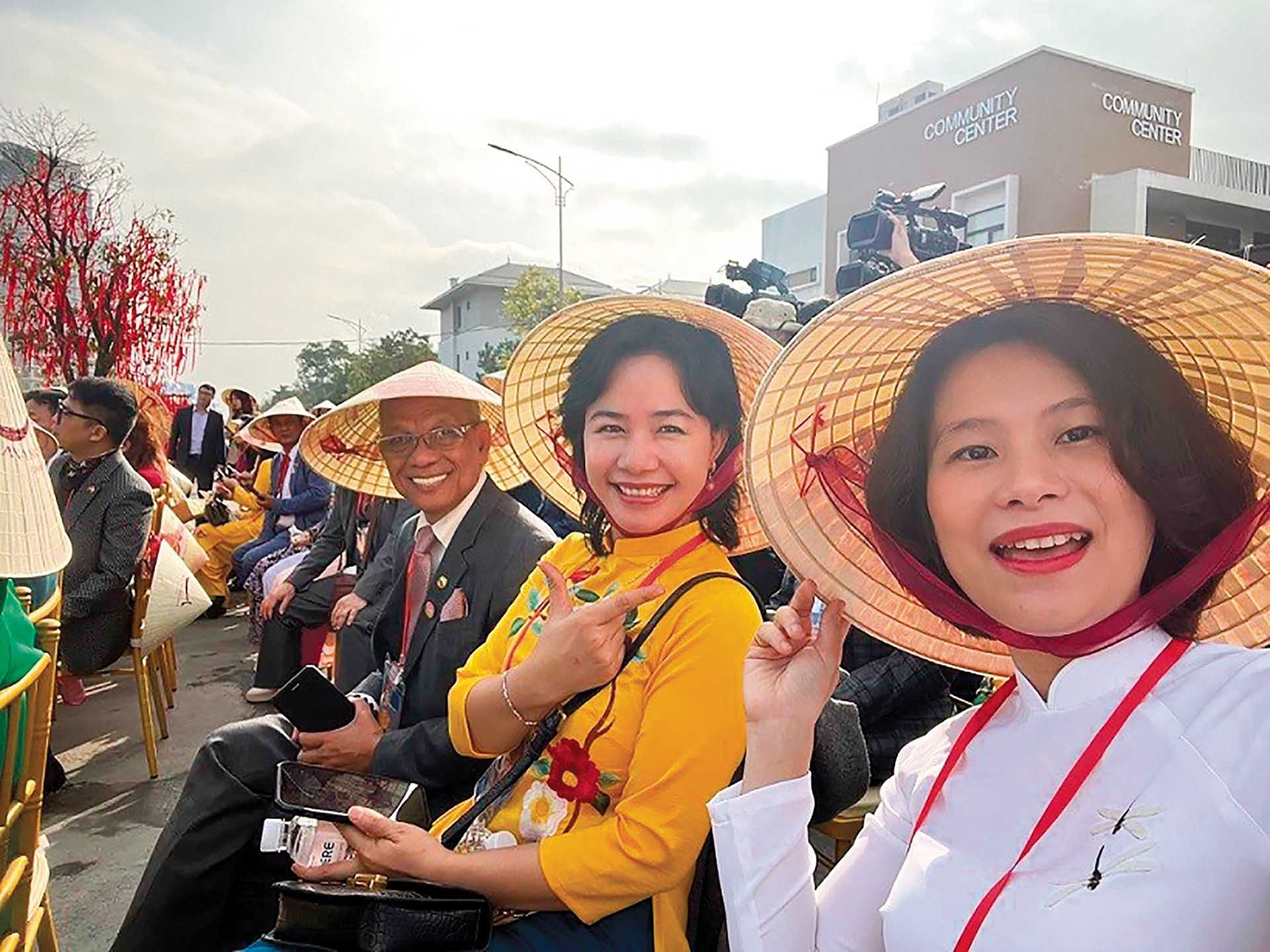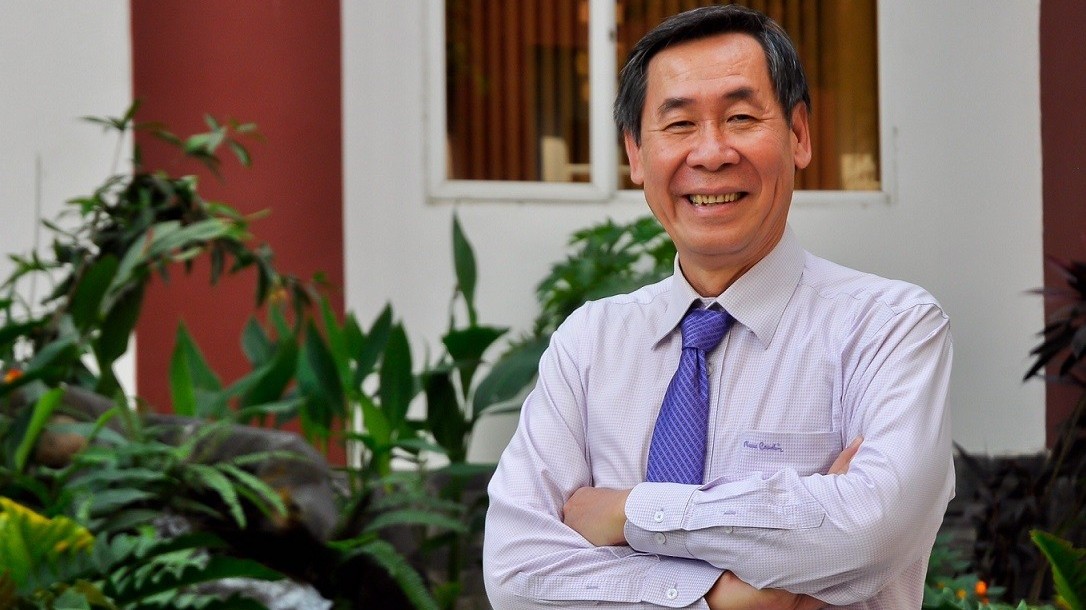
Unlock overseas Vietnamese intellectuals’ flow
Latest
 |
| Prime Minister Pham Minh Chinh took photos with overseas Vietnamese attending the Homeland Spring Program 2023 on the occasion of the 2023 Lunar New Year on January 14. (Photo: Trong Vu) |
The year 2024 will mark the 20th anniversary of the Politburo’s Resolution No.36-NQ/TW, dated March 26, 2004, on overseas Vietnamese (OV) affairs. This Resolution along with Directive No.45-CT/TW on enhancing the implementation of Resolution No.36 and Conclusion No.12-KL/TW, dated August 12, 2021, on overseas Vietnamese affairs in the new situation, has achieved respectable results in recent times. In addition, the entire society’s awareness of the OV intellectual resources’ importance serving the country’s construction and development is constantly developing.
No longer like “autumn leaves”
According to estimates by the State Committee for Overseas Vietnamese (SCOV), of the current total of nearly 6 million OV, the proportion of people with higher education is about 10%, equivalent to 600.000 people, including intellectuals studying and working abroad, and the others are descendants of Vietnamese people in the present country.
Vietnamese experts participate in research and work in most key industries and fields, creating achievements that resonate around the world. For example, Professor Vu Ngoc Tam, Department of Computer Science, Colorado Boulder University (USA) and CEO of Earable company is the only Vietnamese person awarded the 2020 Sloan Research Fellowships thanks to his groundbreaking independent research; Professor Phan Thanh Nam (Phu Yen province) has been awarded one of the 10 European Mathematical Society (EMS) Prizes for 2020, the world’s second prestigious prize in the world, only after the Fields Medal of International Mathematical Union; Dr. Nguyen Thi Hoang Duong is the first Vietnamese scientist to be awarded the Colworth Medal in 2024, which is a prestigious annual award for outstanding researchers in the field of biochemistry, conducting research in the UK or the Republic of Ireland.
In recent times, the OV intellectuals have been making important contributions, helping to transfer knowledge and new scientific and technical advances, mobilizing international resources into Vietnam, training staff, and improving the quality of our country’s human resources.
In particular, the OV intellectuals have increased regional and international connections, creating flexible working and cooperation mechanisms for experts when joining in projects and programs within the national development strategy.
According to Deputy Minister Le Thi Thu Hang, in the current context of globalization and international integration, OV intellectuals are and will continue to increase in number, become more diverse in fields, and increasingly assert their position in the global knowledge community.
The young generation with creative thinking is gradually replacing the older generation, being a great driving force to contribute to the present country and home country.
Mr. Phan Xuan Dung, Chairman of the Vietnam Union of Science and Technology Associations, also said that the intellectuals actively participate in the fields of electronics, biology, medicine, new materials and energy, information technology, aviation, space, and ocean. However, he said that attracting OV experts to participate in our country’s science and technology activities has not yet created a breakthrough both in quantity, quality, and efficiency. Experts mainly join in short-term activities, few come to work long-term, and have no projects, topics, or inventions that can fundamentally change the field of science and technology. Besides, the spotlights in macroeconomic policies are still difficult to implement effectively.
Where are “bottlenecks”?
Explaining this, Ms. Hang stated several subjective and objective reasons, such as OV lacking information about resources to attract; problems in domestic policies, processes, and procedures; lack of a national database on OV so that ministries, localities, and entrepreneurs can exploit it together; in some places and at some levels, administrative procedures are still cumbersome, making OV still skeptical about investing and working in Vietnam.
According to Prof. Dr. Nguyen Van Phuoc, Chairman of the Ho Chi Minh City Union of Science and Technology Associations, various policies have been proposed but not strong enough to encourage Vietnamese scientists and intellectuals to return home. He also shared that the most necessary thing is to properly assess their potential, as well as their position, to be able to come up with specific mechanisms and policies to contribute to the country’s construction and development.
Based on that, as well as the opinion of Vo Xuan Hoai, Deputy General Secretary of Association for Liaison with Overseas Vietnamese, it is necessary to clearly identify the obstacles to the contribution of overseas Vietnamese intellectuals, to have solutions to overcome them; appropriate policies and mechanisms must be implemented to arouse patriotism and national pride, giving them a feeling of being appreciated.
For many OV intellectuals, the desire to return to contribute to their homeland is not to enjoy preferential treatment policies of the Party and State, but to contribute and be recognized for the country’s scientific development. However, according to Professor, Academician Nguyen Quoc Sy - Moscow National Energy University (Russia), Chairman of VinIT Institute of Technology, their return process still encountered many difficulties, so after a short period of time, many people returned to their home country.
Talking about her expectations, Dr. Ta Thi Minh Tam - Charité Medical University (Germany), confided: "Overseas intellectuals like me, all hope to have the opportunity to return to Vietnam as well as hope can contribute to the country’s construction. However, currently, many people are still hesitant because there are no long-term, stable policies. They still feel like “guests”, only coming back to work for a short time under foreign-invested cooperation projects; long-term work opportunities are lacking.”
 |
| Overseas experts and intellectuals return to attend 2023 Homeland Spring. (Photo: Le An) |
Even facing difficulties, talent management must be implemented
This year, Prime Minister Pham Minh Chinh signed Decision 899/QD-TTg on approval for a national strategy for attracting and retaining talents by 2030, with a vision towards 2050. This shows the determination of the Party and State in contributing to accelerating the work of industrialization, modernization, and international integration, realizing the goal of turning Vietnam into a developing country with a modern industry by 2030, high average income, and becoming a developed country by 2050. Talking about this strategy, Mr. Peter Hong, General Secretary of the Overseas Vietnamese Business Association and Dr. Tra My, President of the Provisional Vietnamese Business Association in China, affirmed that developing the country based on human capital represents the right vision.
During his lifetime, President Ho Chi Minh soon realized the important role and resources of the OV community. Notably, during his trip to France in 1946, he persuaded to invite more patriotic overseas Vietnamese intellectuals to return to help the country which was facing many difficulties, including Professor Tran Dai Nghia (Pham Quang Le), Tran Huu Tuoc, Vo Quy Huan, and Vo Dinh Quynh. Later, they all became leading officials, setting the scientific foundation for the country.
Consequently, according to experts, in the context of fierce competition among countries in global supply chains and value chains, Vietnam needs to retain talented people who have been working in the country as well as find ways to attract abroad talents to contribute to the country’s construction.
Professor and Academician Nguyen Quoc Sy said: “Even when facing difficulties, actions must still be carried out, because of the great effect and efficiency, the direct participation, and serving as a bridge of overseas Vietnamese intellectuals all over the world for the work of industrialization and modernization of our country.”

















